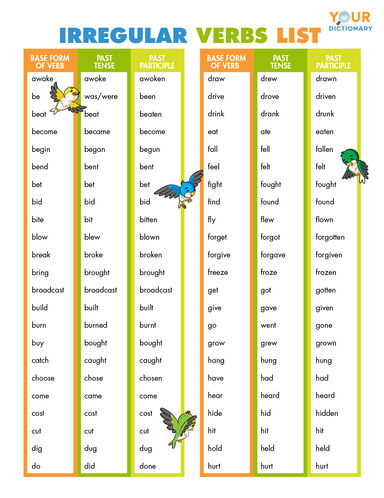
The past participle can also result by adding an "n" to the simple past:Īlthough there are many irregular verbs in English, learning a few for each type of variation will help a non-native speaker know how to conjugate most of them. In English, for example, verbs such as play, enter, and like are regular since they form their inflected parts by adding the typical endings -s, -ing and -ed to give forms such as plays, entering, and liked. Other irregular verbs modify the base form to conjugate in simple past and add an "n" to form the past participle: Others drop a letter from the root in the conjugated forms for the two tenses and add or not a "t" at the end: While most English regular verbs use the ending -ed for the past tense and participle forms, irregular verbs each have their own unique tense forms and past participles. They can change one or more letters within the root, in simple past and past participle: Updated on DecemIrregular verbs are verbs that do not follow the normal patterns for tense and past participle. Some irregular verbs have the simple past and past participle identical with the infinitive: There are irregular verbs that have the simple past identical with the past participle, both very different from the infinitive: Most of the irregular verbs conjugate without following the rules in simple past and past participle.

Restore your mind and body with the ultimate mattress for support and comfort. There are about 200 English irregular verbs, many of them very common. Bring the Westin Heavenly Bed home to experience restful sleep every night. All the verbs that do not follow the rules above in the conjugation of one or more tenses are called irregular verbs.


 0 kommentar(er)
0 kommentar(er)
